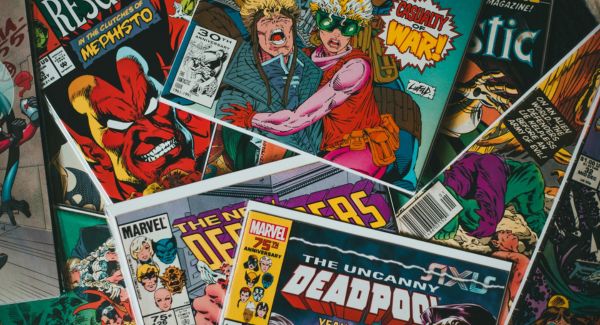If you’ve been banging on doors trying to get your script read—or better yet, financed—it’s time to stop chasing and start attracting.
by Carole Dean
If you’ve been banging on doors trying to get your script read—or better yet, financed—it’s time to stop chasing and start attracting.
There’s a game-changing tool most filmmakers overlook—and it’s not another pitch deck or sizzle reel.
It’s a comic book.

Yes, a full-color, page-turning, visual storytelling tool that sells your story before your film is even made.
And here’s the kicker—it’s not just for superhero epics.
According to Tony Panaccio, a 36-year media veteran, publicist for William Shatner’s video game projects, and current CEO of Victory Comics, “It doesn’t matter the genre. If you want to introduce that IP, you can introduce it through a graphic novel.”
Want to know how to get your script read—and funded—using this strategy? In our latest episode of The Art of Film Funding Podcast, Tony shared his insights.
Hollywood Has Been Doing This for Years
You may not realize it, but critically acclaimed films like The Road to Perdition, A History of Violence, and From Hell all began as graphic novels. These stories didn’t become movies because they were graphic novels. They became movies because their ideas had traction in a visual marketplace—thanks to their comic book form.
As Tony says:
“The marketplace liked the IP and wanted to see it translated into film.”
Now, thanks to advances in indie publishing, you can do the same.
Why Comic Books Make Brilliant Pitch Tools
It’s not just about the story—it’s about access. If you’re an emerging filmmaker or screenwriter without major representation, you’ve probably already discovered the painful truth: you can’t just send your script to studios or production companies. Legal departments won’t allow it. No rep? No read.
But Tony reveals a workaround that turns the system in your favor:
“If you’ve created a comic book and the comic has been sold anywhere—online, at a store—it is a copyrighted story. Production companies will take it faster than they would ever take just a screenplay.”
Even better, a comic book doesn’t come with the legal baggage. No waivers. No fear of lawsuits. Just a published IP that filmmakers and producers can actually engage with.
The Fastest Way to Inspire Investors
According to Victory Comics’ COO Jan Stein, an internationally award-winning producer and former Marvel Studios executive, comic books do something scripts and pitch decks can’t:
“An investor can pick up a comic book, look at the visuals, visualize the world, see the characters… and gain inspiration for that project.”
A great comic becomes a mini-portal into your movie. And it’s digestible. Unlike a dense screenplay, a comic book will get read—tonight.
“People don’t like reading screenplays as much as they enjoy reading comic books. It’s just that simple,” Tony adds.
Comics Attract Top Talent Too
Back when Tony worked at CrossGen Entertainment, Disney bought the company after they built out 17 comic titles. One key strategy? Using those comics to pitch talent.
“We made deals with Robert Zemeckis, Wes Craven, Bob Gale… all from the energy they got from the comics.”
In other words: your comic is not just a visual treatment—it’s a recruitment tool for creative partners, directors, and stars.
But What About the Cost?
You might be wondering: “Isn’t creating a comic expensive?”
Surprisingly, not as much as you think.
“Figure about $25,000 for a 22–24-page color comic book,” says Jan. “That’s just to get the book made—not including printing. A four-issue graphic novel? Around $100K to $150K.”
Compared to an indie film? That’s a fraction of your production budget.
And here’s a brilliant hack from Tony:
“Build the cost of the comic into your film’s marketing budget. It’s a marketing tool. If you do that, your comic becomes revenue-neutral.”
Even a small print run of 250 copies can be used as pitch material and giveaways at meetings or festivals. Want to save even more? Start in black and white, or offer a digital PDF version.
Still, Tony insists:
“There’s nothing like handing someone a physical comic book and letting them feel and touch those pages.”
Press Buzz Like You’ve Never Seen
Comic book media isn’t niche anymore.
“Today, Variety, The Hollywood Reporter, Deadline, Forbes, The New York Times—they all cover new comic book releases,” says Tony. “You get a press bump for your film just from launching the comic.”
That’s marketing momentum before the cameras ever roll.
From Comic to Casting: The Nick Fury Story
Want to know how Samuel L. Jackson became Nick Fury in the Marvel Cinematic Universe?
The comic came first.
Years before the films, artist Bryan Hitch redesigned Fury in Marvel’s “Ultimate” universe to look exactly like Jackson—with his permission. When it came time to cast for Iron Man and The Avengers, the comic made the decision easy.
“They just went with Sam Jackson because the character already looked like him.”
Now imagine that working for your lead character.
Final Tips: Conventions, Publishing & Community
Once your comic is printed, you can start touring the comic convention circuit—which has way more opportunities than the limited film festival circuit. According to Jan:
“Every major market has conventions. You do panel discussions, get fans excited, then they can buy the comic right at your booth.”
As for publishing, Tony recommends starting small. While landing a deal with a major publisher like Dark Horse or IDW is great, self-publishing may be faster and more strategic—especially if your goal is to support the film.
The point isn’t mass distribution—it’s traction. You want to prove your IP exists and get it into the hands of the right people.
Why You Should Turn Your Script into a Comic Book
- ✅ It gives you legal access to pitch your story to producers.
- ✅ It visually communicates your world to investors and talent.
- ✅ It costs less than you think—and can be built into your marketing budget.
- ✅ It generates press coverage in both comic and mainstream media.
- ✅ It opens doors at comic conventions and creates an audience before your film exists.
- ✅ It may be the one piece of material that actually gets read.
“If you hand someone a script, it could be weeks. If you hand them a comic, they’ll read it that night.”
Turn your screenplay into a comic book
It might be the smartest move you ever make.
Carole Dean is president and founder of From the Heart Productions; a 501(c)3 non-profit that offers the Roy W. Dean Film Grants and fiscal sponsorship for independent filmmakers. She is creator and instructor of Learn Producing: The Ultimate Course for Indie Film Production. Essential classes for indie filmmakers on how to produce their films.
She hosts the weekly podcast, The Art of Film Funding, interviewing those involved in all aspects of indie film production. She is also the author of The Art of Film Funding, 2nd Edition: Alternative Financing Concepts. See IMDB for producing credits


